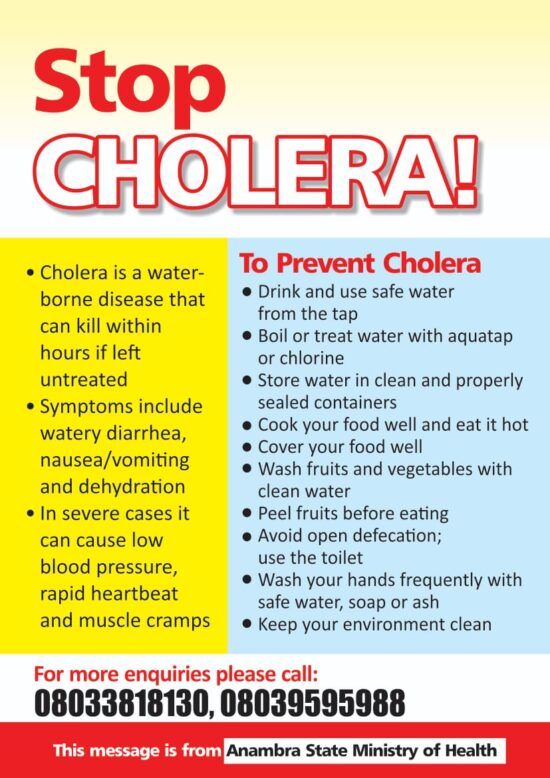File picture of cholera patients
There is a clear and present danger of a cholera epidemic ravaging the states of Nigeria. Although Anambra state has thus far not been affected, it is crucial to be prepared and guard against the danger.
The Nigeria Centre for Disease Control and Prevention (NCDC) has put out information on an increase in the death toll and spread of cholera across 32 states and 115 local government areas (LGAs) in Nigeria.
The Deputy Director of Surveillance of the NCDC and National Incident Manager for the Centre, Dr. Muntari Hassan, announced that 54 deaths and 1,579 suspected cases have been documented since the beginning of the year.
It is noteworthy that Nigeria has been placed at high risk for increased cholera transmission and impact due to the rainy season. The NCDC reveals through its latest epidemiological report that Nigeria has recorded a case-fatality ratio (CFR) of 1.9% as of the beginning of June 2024.
Advertisement
The cholera outbreak has affected 32 states, with Bayelsa State being the most impacted, accounting for 50% of all suspected cases. The other affected states include Lagos, Zamfara, Abia, Bauchi, Cross River and Ebonyi to mention a few.
As things stand, the NCDC continues to monitor and respond to the outbreak through its national multi-sectoral Cholera Technical Working Group, in collaboration with various federal ministries and development partners.
It is on record that cholera outbreaks in Nigeria have been a recurrent issue, with major epidemics recorded in the past. According to the Africa office of the World Health Organization, Nigeria experiences an increase in the number of cholera cases during the rainy season every year.
Advertisement
Cholera, caused by the bacterium vibrio cholerae, spreads through contaminated water and food, leading to severe dehydration and, in some cases, death, if untreated.

The Anambra State Ministry of Health has been dutifully intensifying efforts to stop the coming and spread of cholera through improving water, sanitation, and hygiene (WASH) practices, as well as deploying rapid diagnostic tests and enhancing surveillance.
Everybody must strictly adhere to the standard of hygiene outlined by the Ministry of Health. The measures include:
Advertisement
- Use water from reliable safe sources, boiling water before drinking, storing water in properly sealed containers, and ensuring that bottled water is properly sealed before drinking.
- Safe food preparation must not be compromised. The mandate is to wash it, peel it, or cook it. Fruits and vegetables must be washed with clear running water. Fruits need to be peeled before being consumed. Food must be cooked well and covered properly when not immediately consumed.
- The hands must be washed frequently with soap and clean running water.
- Hands must be washed before and after eating.
It is critical to put a stop to open defecation, indiscriminate refuse dumping, improper disposal of waste and clearing of sewage.
The common symptoms of cholera are watery diarrhoea, nausea, vomiting, and dehydration while the severe symptoms are low blood pressure, rapid heart rate, persistent vomiting and muscle cramps.
It is heartening that Anambra State’s emergency response teams are actively conducting surveillance in all 21 LGAs to promptly identify and contain any potential cases. Cholera is highly contagious and must not be allowed to come at all and spread in Anambra State.
Nwosu is the commissioner for information in Anambra state.
Advertisement
Views expressed by contributors are strictly personal and not of TheCable.
Add a comment










